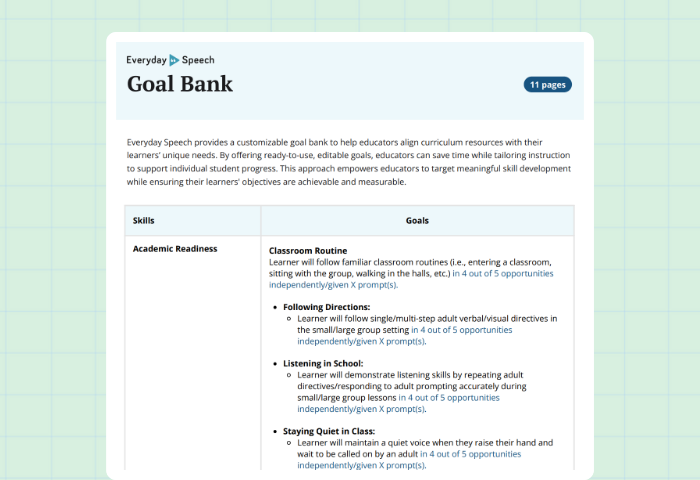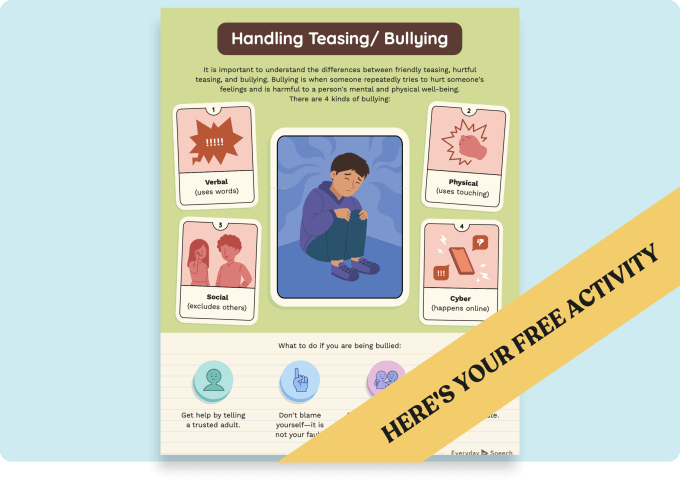Setting Meaningful IEP Goals for Improving Social Skills in Students
Get free social skills materials
No-prep lessons on self-regulation, emotional recognition, conversation skills, and more.
Sign up hereDownload 50+ Example IEP Goals
Customizable library of strengths-based goals
Welcome to my blog post on setting meaningful IEP goals for improving social skills in students. In this post, we will explore the importance of social skills development in students with IEPs and provide guidance on how to set effective goals to support their growth. Let’s dive in!
Understanding Social Skills and IEP Goals
Social skills are essential for academic and personal success. They encompass a range of abilities, including communication, emotional regulation, perspective-taking, problem-solving, and relationship-building. Students with social skill challenges often require additional support to thrive in social settings.
Individualized Education Programs (IEPs) play a crucial role in providing tailored interventions for students with special needs, including those related to social skills. By setting specific, measurable, achievable, relevant, and time-bound (SMART) goals within IEPs, we can ensure targeted growth and progress.
Identifying Social Skill Areas for Goal Setting
Before setting IEP goals, it is important to assess students’ social skill deficits. Various assessment methods, such as observations, interviews, and standardized tests, can help identify areas of improvement. Common social skill areas to consider for goal setting include:
- Communication and conversation skills
- Emotional regulation and self-control
- Perspective-taking and empathy
- Problem-solving and conflict resolution
- Building and maintaining relationships
Writing Meaningful IEP Goals for Social Skills
When writing IEP goals for social skills, it is crucial to follow the SMART framework. This ensures that goals are specific, measurable, achievable, relevant, and time-bound. Here are some examples of well-written IEP goals:
- “By the end of the school year, the student will initiate and maintain a conversation with a peer for at least five turns, using appropriate eye contact and turn-taking skills in 80% of observed opportunities.”
- “Within six months, the student will demonstrate improved emotional regulation by utilizing at least two self-calming strategies independently in 90% of observed situations that typically trigger emotional distress.”
- “By the end of the semester, the student will accurately identify and describe at least three emotions experienced by others in 75% of observed social scenarios.”
- “Within three months, the student will independently generate at least two alternative solutions to a given social problem in 80% of observed situations.”
- “By the end of the academic year, the student will initiate and maintain at least two reciprocal friendships, engaging in shared activities during recess or lunchtime on a regular basis.”
Strategies for Supporting Social Skills Development
Implementing evidence-based interventions and strategies is crucial for supporting social skills development. Collaborating with teachers, parents, and other professionals can reinforce social skill goals across different environments. Regular monitoring of progress and making necessary adjustments to IEP goals ensure continuous growth and success.
Conclusion
Setting meaningful IEP goals for improving social skills in students is essential for their overall development. By following the SMART framework, identifying social skill areas, and implementing evidence-based strategies, we can provide the necessary support for students with IEPs. If you are in the discovery stage of seeking resources and support, I encourage you to start your EverydaySpeech Free trial today. Together, we can empower students to thrive socially and academically!




